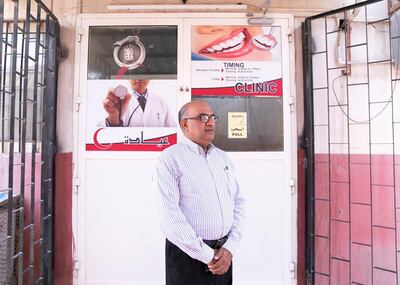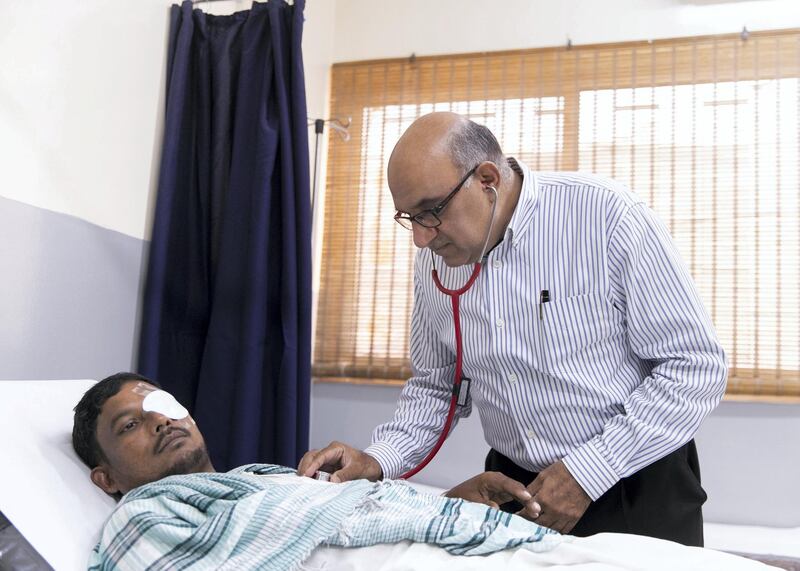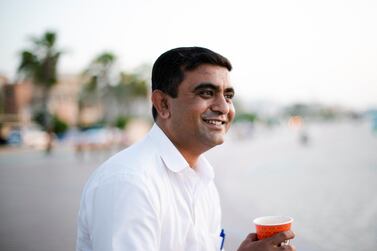A “passion to treat the poor” lead one man to dedicate his life to providing quality medical care at affordable prices to low-income workers.
What began with the work of one doctor in a clinic has since developed into a nationwide goal to encourage workers not to ignore symptoms for fear of medical costs.
“We see patients who are like time bombs moving around unaware they have high blood pressure, high sugar levels and need immediate hospitalisation,” said Dr Sanjay Paithankar, 59.
The India doctor moved to the UAE in 1988 to work in government hospitals and private clinics in Abu Dhabi, Sharjah and Dubai, handling cardiac emergency cases.
He soon became aware of the need for medical care for people who lived in far-flung areas away from hospitals and opened his first clinic in 1993 in Ajman in a garment industrial area.
News spread about a facility offering care for Dh10, including medicines, and labourers from neighbouring regions streamed in for treatment.
“I wanted to reach people who could not afford quality care and serve them at their doorstep,” said Dr Paithankar.
“When you save the life of one worker, you also save the whole family dependent on that person.”

This truth was brought home when he helped rescue a Pakistani worker on a hot July afternoon in 2005.
The proximity of his clinic to the man’s accommodation in Dubai’s Qusais area ensured intravenous fluids could be immediately administered.
“The men who carried [the patient] in thought he was dead because he did not move. He was in severe shock,” Dr Paithankar said.
“A week after he recovered, the man came back and touched my feet. He said ‘you have not saved only my life, you saved the life of my family because without me they will not survive.’”
Dr Paithankar now runs 57 clinics, treating 850,000 patients annually, after his combination of low cost and high patient intake drew the interest of an investor.
The facilities are known for their compassion towards workers.
“My friend couldn’t breathe and was rushed here,” said Raj Mohan, a construction worker.
“They treated him first and he gave the money the next day. Who does that in this world?”
Dr Paithankar’s instructions to staff are clear: patients must be treated with respect and their medical complaints addressed promptly.
He regularly checks on the clinics, asking staff why the same patient has visited a clinic three times without the problem being resolved.
Recently, at a busy clinic in Dubai, Dr Paithankar checked patients himself and administered treatment for fever, flu and headache.
“I only take on staff who are fine about working with poorer people. There has to be a passion to treat the poor,” he said.
“The people who come in don’t have money for the first consultation, forget a second visit.
“We need to give them confidence that when they come in they will be treated.”
The clinic’s fees have remained low, between Dh20 to Dh25, compared to more than Dh100 charged by private facilities.
The affordable fees attracts patients and Dr Paithankar hope to treat 1 million patients a year across 57 clinics by 2020.
He refuses to take out a loan to start a new business and designs all the interior work himself to save costs.
“I don’t want to be stressed about giving money back to somebody,” he said.
“The clinics are never posh, but it is a place that workers should feel comfortable in.”
Although medical insurance is mandatory for all categories of workers in the UAE, some expensive tests and medicines are not covered depending on an employee’s insurance package.
The fear of taking time off from work or spending money on medication prevents workers from approaching doctors.
They only come in for treatment when their symptoms are severe and this is the mind-set that Dr Paithankar aims to change.
Timely check-ups can treat conditions such as diabetes and heart ailments before it reaches a critical stage.
“My motto is to serve the people who are the have-nots,” he said.
“I simply want to give back with medical care for people who cannot afford it.”
His philanthropy extends to India where he has donated a chemotherapy ward to a cancer hospital in his hometown of Nagpur.
In July, Dr Paithankar was granted a 10-year residency visa under the government’s new Golden Card scheme. This only reaffirmed his commitment to affordable healthcare in the UAE.
“This gives me increased confidence because I know that I continue for much longer here,” he said.
“I’m deeply invested in my clinics and now I know for the next 10 years and more I can work here without any issues.”






